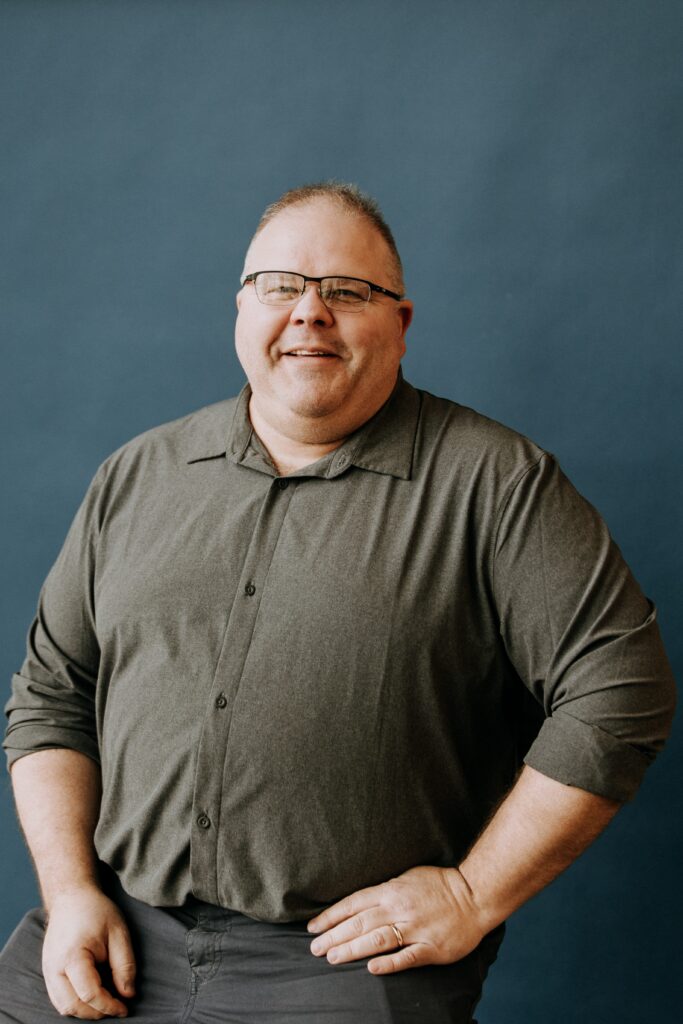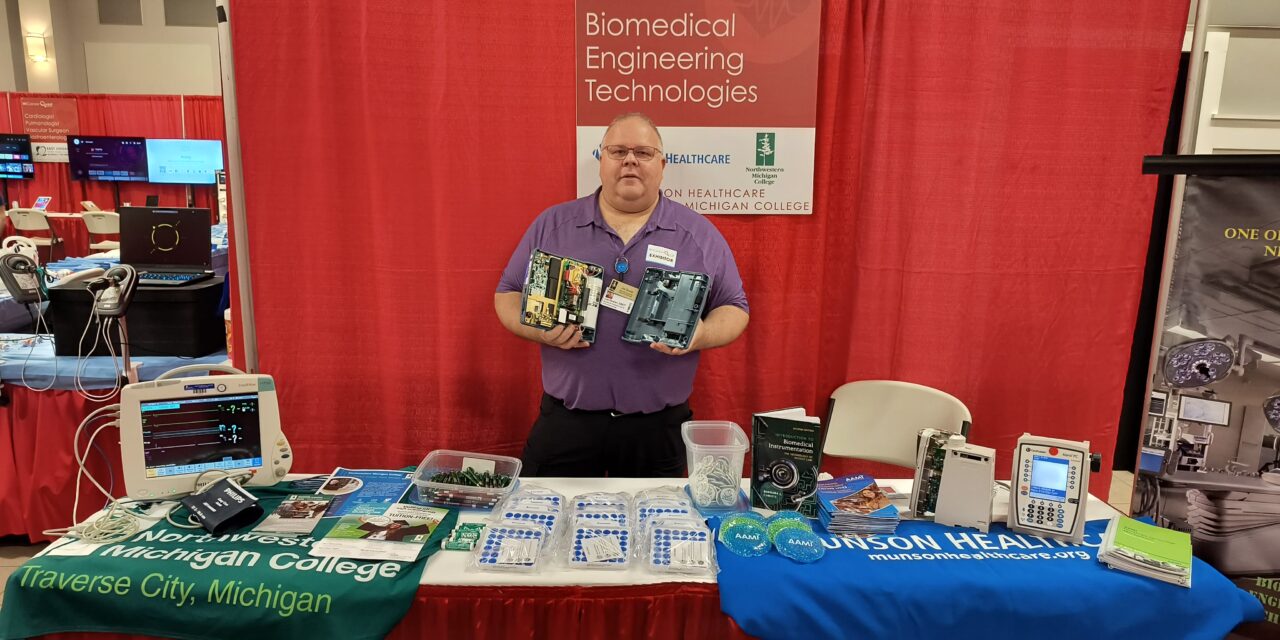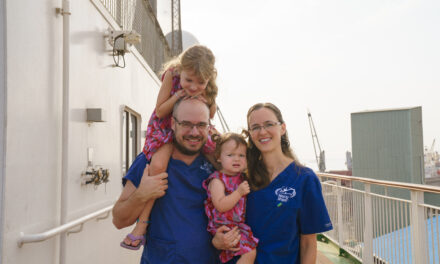Joe Deater combines his career as a biomed with teaching aspiring technicians and guiding national standards.
By Alyx Arnett
Air Force veteran Joe Deater, CBET, has spent nearly three decades as a biomed at Munson Medical Center in Traverse City, Mich—while building a pipeline for the next generation of healthcare technology management (HTM) professionals. Named the 2025 AAMI & GE HealthCare BMET of the Year, Deater says the recognition hasn’t sunk in. “I don’t think of myself on that level,” he says. “I just do my job.”
In addition to his day job as a BMET III, Deater has been an adjunct instructor at Northwestern Michigan College since 2017, where he developed a two‑semester biomedical technologies course from scratch. In a field that still struggles for visibility, Deater says he’s determined to put HTM on students’ radar and get the field off the “Best Jobs You’ve Never Heard Of” list.
That same drive extends beyond the hospital and classroom. Through his work with AAMI, serving on several standards committees, Deater has helped shape guidance that influences HTM professionals nationwide.
From Fighter Jets to the Biomed Bench
Deater’s path into HTM began before graduation. While still in high school, he learned about the field from his older brother, who was serving in the US Air Force and told him about the military’s well-regarded biomed training program. Deater ultimately went a different route, serving as an avionic systems specialist on F-16s. He spent four years stationed in Utah and completed a three-month Gulf War deployment.
After leaving the military, he used his GI Bill to enroll in Baker College of Muskegon, where he discovered a biomed program and made it his major. The program wasn’t widely known or attracting many students at the time. “I was the only one in the program. My fellow students had no idea what I was doing, and very few of my instructors knew what I was doing,” he says.

He took his first job while still in school, joining the two-person biomed team at North Ottawa Community Hospital. The broad exposure cemented his interest and set the stage for a long tenure at Munson Medical Center. “They’re good to us. They take care of us,” he says of the Traverse City system. “We’ve had strong C‑suite and director-level leadership that understood the importance of having in-house biomeds.”
When Ingenuity Became Essential
Across his career, Deater has seen his share of challenging moments. He still remembers the sinking feeling of sidelining an anesthesia machine after a screw snapped during a ventilator check. “I knew it as soon as it happened, and there was no way that without that screw it was going to be passed,” he says.
The pandemic, however, brought a different kind of problem-solving. With supply chains snarled, Munson’s powered respirator hoods began running into battery issues. Replacement packs weren’t available. “I was tasked with trying to figure out how to supplement that,” Deater says. He tracked down a battery-building firm in Minnesota, sourced individual cells, and built pack assemblies to keep staff protected. “We had to do what we did,” he says. Those home-built packs, he adds, are still in use.
He also remembers being tasked with evaluating whether ventilators could support more than one patient and testing anesthesia machines’ ventilator systems as contingencies for shortages.
5 Questions with Joe Deater, CBET
- First job ever
- I was a ranch hand and took care of 12 horses, feeding, watering, stall cleaning, baling hay, and picking rocks in the training rings, amongst other horse farm needs.
- Favorite tool in your toolbox
- Probably my 24-1 plier wire stripper cutters right now. Handy set.
- Most-used piece of advice you give students
- Don’t sit around waiting for someone to show you what to do. Be proactive and take charge of your own learning. When they get into their first job, rarely will anyone take them by the hand and show them anything. If they want to learn and move up, they have to promote themselves.
- Dream piece of equipment to work on
- Robots. I would like to get trained on the Da Vinci or any of the new surgical robots that are coming out. They are so new still that even if I were to get trained, we are limited on what we can actually repair on them.
- One thing people would be surprised to learn about you
- I love Halloween. Our house is the neighborhood must-stop house. I never do scary, though. I like having the little ones not afraid to come trick-or-treating. I usually do a new theme each year. I have done “Game of Thrones,” “Alice in Wonderland,” “Avengers,” “It’s the Great Pumpkin, Charlie Brown,” and many others. I always have a hot spiced cider, and for adults, I have kickers they can have added to it if they want. Mom and dad deserve a treat too, and in Northern Michigan, we can have some cold and rainy/snowy Halloweens.
Turning Educator on Short Notice
Deater’s shift into teaching was as abrupt as it was consequential. Munson’s HTM leadership had approached Northwestern Michigan College about starting a local biomed program to ease recruiting pressures in the rural region. The college said yes, the paperwork was signed, and a colleague was slated to teach. Then, in mid-November 2017—just weeks before classes were to start in January—Deater learned the instructor could no longer take it on.
“I was thrust into being an educator at a college level that I’d never had any experience doing,” he says. With about six weeks to build a syllabus and curriculum, he pushed ahead. It didn’t get easier in the early years. A textbook change, curriculum overhauls, and a rapid shift to online instruction during COVID-19 meant rewriting the program four times. Still, momentum has grown steadily. Twelve students have since graduated from the program.
Recruiting remains one of the biggest challenges. Michigan’s other biomed program sits near Detroit, where schools and students are plentiful. Northern Michigan is different. “People love to vacation here, but to actually move here is another story,” Deater says. His solution is to grow local talent through Northwestern Michigan College’s program. To expand awareness, Deater attends job fairs and visits schools across 28 counties, helping students see HTM as a viable career path. “It’s really a young program,” he says, “and we feel that it’s slowly growing.”
Evolving With IT
Deater has worked to ensure future biomeds are prepared for today’s demands, shaping his coursework at Northwestern Michigan College to include IT fundamentals alongside traditional biomed training. “There is a big difference between healthcare IT and regular IT,” he says. “If my students at least have IT knowledge of the acronyms and the language, they can communicate with IT on a better level when they become biomeds.”
That focus reflects Deater’s own career path. He entered HTM in 1995 during the transition from tubes to solid-state electronics and has watched component-level repairs give way to board swaps. As medical devices have become increasingly networked, biomeds face new responsibilities and work more closely with IT teams than ever. “Especially in the last 10 years, we’ve seen [IT integration] ramp up even more,” he says.
In some training environments, clinical application specialists now sit alongside biomeds, underscoring how blurred the lines have become in supporting connected clinical systems.
Standards and Advocacy Beyond the Shop
Deater has played a role in shaping the profession at the national level through his work with AAMI. He has served on committees including the Technology Management Council and co-chairs a vocabulary standardization effort to harmonize terminology across biomed-related standards. The goal, he says, is to create a living reference that supports consistent, clear language for future standards development.
He has contributed to AAMI white papers as well, including a 2022 survey examining “gray areas” of equipment service in HTM—situations where it’s unclear whether HTM, IT, facilities, or another department is responsible for maintaining certain devices. The survey of nearly 200 HTM leaders highlighted how undefined service roles can lead to confusion, delays, and even patient safety risks, and it compiled guidance to help hospitals better document responsibilities.
Another project updated the national count of active biomed programs during the pandemic. “Going into COVID, we had 82 programs. When we came out of COVID we had 71,” he says. That contraction, he argues, makes local pipelines and outreach even more urgent. “It makes it difficult to develop new biomeds if we have shrinking numbers of schools that students can go to.”
A Field That Never Stops Learning
Deater’s advice to working biomeds is straightforward: “Keep learning. Don’t let yourself get behind,” he says. For students, he tells them graduation is really the beginning. “We give you base knowledge. Once you graduate and you get that job, then your education really starts, and you’ll be a lifelong educator after that.”
That belief drives everything he does—from teaching students to shaping national standards that influence the profession. Even after nearly three decades in the field, Deater is focused on what comes next: growing local talent, strengthening HTM’s voice, and preparing future biomeds for an increasingly connected world.
Photo caption: Joe Deater promotes HTM careers to middle and high school students at MiCareerQuest, an interactive career exploration event.
Photo provided: Joe Deater





